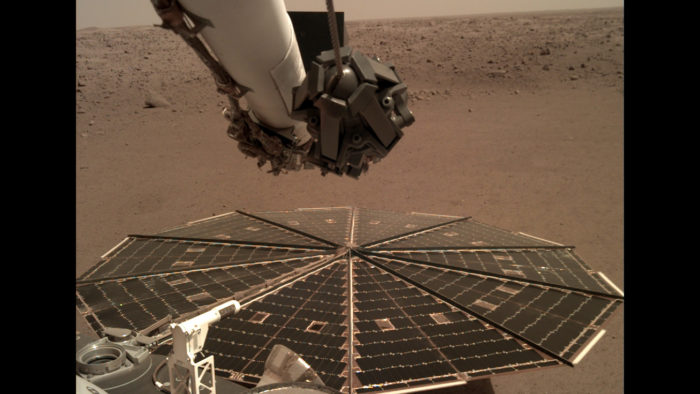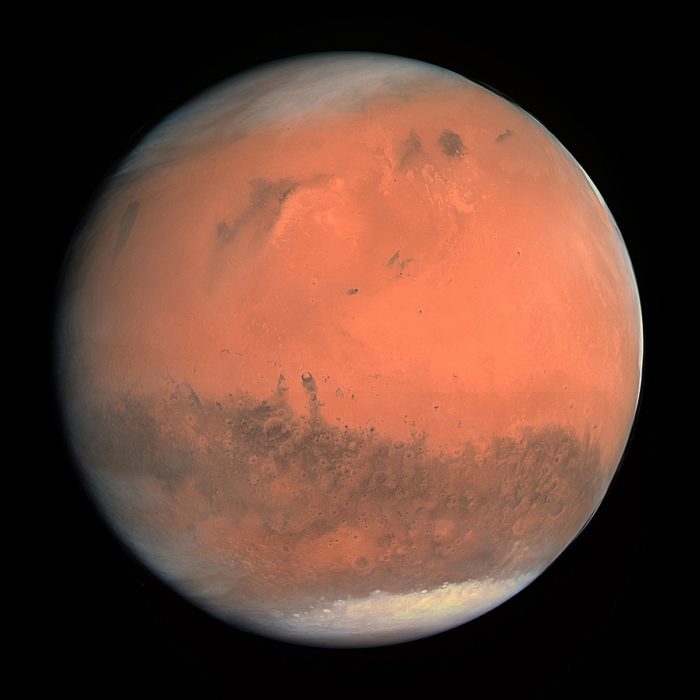Seeing Red
Mars is back in the news in recent weeks. NASA’s InSight lander has been snapping hi-res selfies and delighting the world with stunning views of the Martian landscape. Well, as stunning as a wasteland of red rocks under a dusty red sky can be. Still, it’s pretty amazing that a robot assembled here on Earth is now scooting along on another planet more than 33 million miles away and beaming back photos that are clearer than the pictures I take of my kids.

Image copyright NASA
As with any Martian mission, speculation and curiosity are in abundance. Will this mission detect surface water? Will we finally find signs of life? Will we bring Matt Damon home? I noticed that Amazon Prime released the Tim Burton goof-fest Mars Attacks to coincide with the excitement. In that movie, Pierce Brosnan’s scientist character tells Sarah Jessica Parker’s ditzy journalist that the reason we hadn’t yet detected Martian life is because their civilization developed beneath the surface. With the InSight lander expected to drill a full five meters into the red dirt, who knows what wonders we will uncover?
Along with the scientific hoopla that accompanies all interplanetary missions, especially those to our red neighbor, the general public becomes enamored with the possibility of manned Mars missions looming on the not-so-distant horizon. When Silicon Valley demigods like Elon Musk turn their attention to Mars, it’s hard not to get carried away on a wave not unlike the one that swept pioneering wagon trains westward. A bright and vibrant future awaits those brave enough to take the leap into the unknown and forge a new world out of the cold rocks of a hostile planet.
The only problem is, we’re a long way for anything like this happening in any form or fashion. I’m quite cynical about space travel, considering how little progress we’ve made over the last 50 years after man first walked on the moon. I place a lot of the blame on Hollywood for making space travel seem a lot easier than it really is (along with hand-to-hand combat, shooting guns, surviving an apocalypse, and finding true love). Getting a human into geostationary orbit is a massive undertaking; sending one to Mars and keeping them alive is literally astronomical. Of course, with enough brains and resources, history has shown that the impossible can become possible, and I would only be moderately surprised to see a manned mission to Mars in my lifetime.
It’s not the concept of a manned Martian mission, or even a Martian colony, that I push back against. It’s the idea that things would somehow be better if we could just get off this crowded, polluted rock called Earth. How many times in history have people ventured out into unknown lands in search of a better life? There is hardly a patch of unexplored land in our world today, and what do we find in every one of these previously unknown places? Greed, lies, jealousy, laziness, corruption; every vice that afflicts the human condition. What makes anyone think that a colony on the moon or Mars or Europa would be any different?
The problem is sin. No matter where a human goes, there goes sin along with them. And no matter what humans try to do or build or conquer, it is all in vain unless their endeavors are blessed by God (Ps. 127:1). Sure, going to Mars might solve problems like overpopulation for the select few that journey there, but that isn’t the real problem, is it? Pollution, waste, pillaging of resources, etc. are merely symptoms of the evil nature that resides in the heart of every person that has ever lived. Unless God reaches into that heart and restores it through His divine favor and grace, there is no hope for us, no matter how far into the stars we go.








































I mean, if I had to choose between Star Trek-type warp space travel and Star Trek-type Happy Hippie Utopia with No Poverty, I’d probably go for the latter.
I don’t mind people getting excited about it, since it is fascinating, but I do agree that if we started a colony on Mars there would be problems there, too.
Researching space stuff sometimes helps us find solutions that can be implemented here, though, and people aren’t as likely to do that research if there isn’t hype for it, so there’s that.
The idea of expanding to other planets is backed by this deep humanist thinking. “We’re only bad because of our society and those bad religious people making us feel bad about ourselves! Man is basically good, so if we could just get away from Earth’s baggage, we could build a new utopia among the stars!”
I mean, this philosophy pervades science fiction. Also any kind of music about it, like the Final Countdown, or that cool but depressingly humanistic Hope For the Future by Paul McCartney. Getting out to other planets is equated with going to Heaven. It’s our first step to godhood, right?
Unfortunately, that sin nature is a thing that we take with us, as Mark said in the article. It’s fine to want to colonize other planets, but it won’t be a utopia. I mean, just reading about how important Earth’s magnetic field is to the human brain–and imagining people trying to live on a planet without one–pretty much dooms the whole project.
Personally, I delight in the failures of clearly humanistic scientific endeavors. Romans 9:20 for the mic drop.
Going to Mars cannot be said to be so enormously difficult we couldn’t do it. We could have been to Mars in the 70s if the public had chosen to fund missions to Mars–NASA had sufficient infrastructure at the time. But Nixon felt tax cuts and the Vietnam War were more important. In the 80s, NASA put all of its eggs in the single basket of the space shuttle, which turns out was a much worse idea that sticking with the Saturn V rockets that put human beings on the moon. Our space program is still recovering from that bad decision.
Human space exploration since the race to the moon has been abominably mediocre–basic ideas as rotating spacecraft on a axis to produce a sense of artificial gravity that would alleviate most of the problems of a long journey haven’t even been EXPERIMENTED with at all. Nor have other obvious members like good shielding against radiation been seriously tried.
We humans may never make it to Mars but it’s because (in my opinion) we’re lazy and mostly disinterested in exploration unless there’s an obvious profit to be made from it and frankly are more interested in building massive sports stadiums and other forms of entertainment of dubious value rather than learning whether or not we really could live on other worlds. To me, it seems obvious we should want to travel through the stars–they are inherently interesting, wonders of God’s handiwork. If I had to chose between the hippy utopianism of Star Trek and working starships, I’d pick the starships in a heartbeat.
But that’s really because I think starships are possible, while elimination of all human evil isn’t possible…I don’t agree that wanting to explore outer space is necessarily linked to ideas of creating utopian ideals on other worlds.